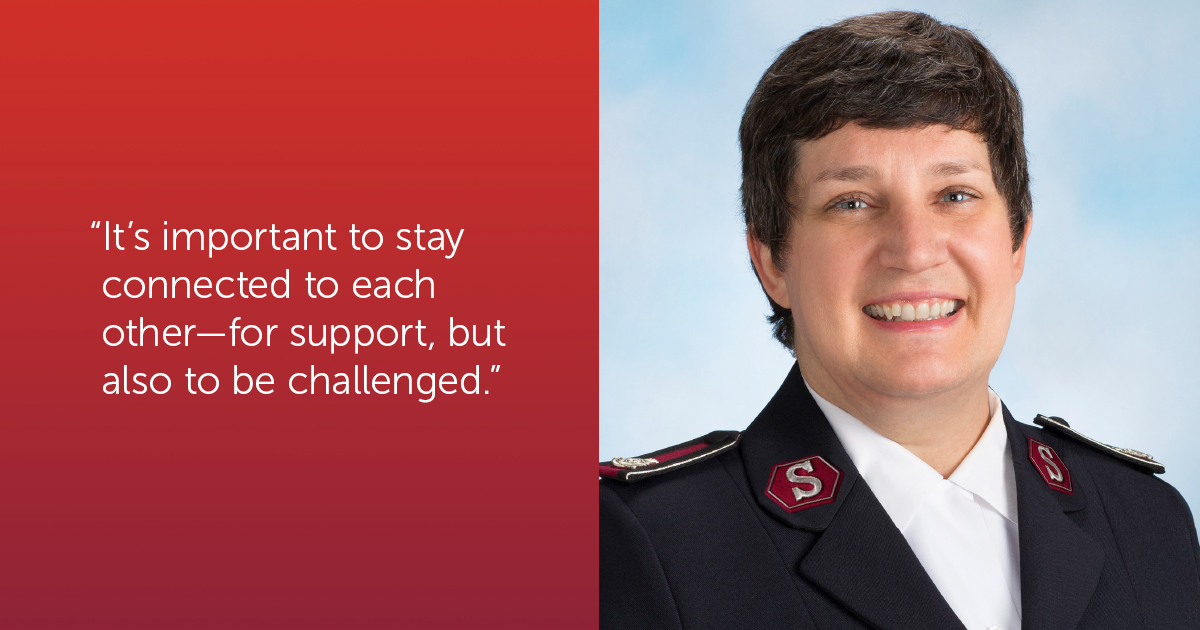Tell us about your calling to officership. What inspired you? And what have been the highlights along the way?
I grew up as a child of officers, and that was a positive experience. My parents included me and my siblings in ministry in practical ways. I have memories of helping clean the building before Sunday services and going along to open airs. They were great role models and spent their entire career as corps officers. I loved to watch how they interacted with and impacted people in their communities. I didn’t appreciate it as much when I was a child, but as I grew older, I recognized the value and wanted to do something similar.
I’ve had an interesting and diverse officer life, which is good because I like variety. I started as a corps officer and had three opportunities to be on the College for Officer Training staff in Chicago. Developing leaders is one of my passions, and I got to learn how to do that in practical ways. I also spent time in the youth department, both as a divisional and territorial youth secretary. That all linked together with my love for developing people and seeing them grow.
As the training officer in the Latvia and Sweden Territory, I helped create a training college for Latvian cadets. I spent the last few years as a divisional leader in the Kansas and Western Missouri divisions in the U.S.A. Central Territory before embarking to London, England.
What was it like to serve as chief secretary at International Headquarters (IHQ)?
London was a great place to live—not just because it’s a great city, but because it’s a global city. Being at IHQ with officers and employees from around the world was a unique and treasured opportunity—having that global view and connection each day.
What are you looking forward to most about serving in the Canada and Bermuda Territory?
As much as I loved my role at IHQ, it was somewhat removed from front-line ministry. I’m looking forward to being closer to what’s happening on the front lines in Canada and Bermuda and joining in and supporting that work. It will bring me a new perspective.
What is the key to thriving in Christian leadership these days?
It’s challenging for all of us during a pandemic. At IHQ, we’ve been talking a lot about transition. Not in the sense of physically moving or taking up new appointments, but rather in the way that the world around us is shifting. In our changing world, thriving means maintaining connections, both personally and in ministry. I strive to stay connected to people who are engaged in mission and learn from and listen to them. I’m a team player, and I want to hear from my team.
“I see the most hope right on the front lines”Where have you seen The Salvation Army stepping up to serve in COVID?
I am so proud of The Salvation Army during these days. At IHQ, I read exciting reports every week from the COVID working group about how we’re supporting projects around the world. Some are simple, like providing a hand-washing system for a grade school so kids can be COVID-safe. Others relate to our non-discriminatory policies, how we are reaching out to people we’ve never had a chance to reach before. The beauty of the Army is that we serve people regardless of who they are, what they believe or where they come from.
As a leader, how have you tended to your own walk with the Lord?
I’m a social person. I love to be in corporate worship. I love to connect with friends, pray with them, share concerns, and talk about the Bible and life. All of that feeds my own soul care. I’m not very good when I’m isolated, which can be a challenge in COVID. But I’ve also found that the Lord has spoken to me through my daily walks. Getting out to the park, into nature, I have an even a deeper appreciation for God as Creator.
What encouragement would you offer to other ministry leaders?
I think it’s especially important to stay connected to each other—for support, but also to be challenged. And to be sure that we’re being accountable and on the right track. Because when we isolate, we can just make up our own answers. It’s also important not to always be looking inward, but to look out into the community and be aware of why we’re doing what we’re doing. Who are the people that God is calling us to serve? What are their true needs? What brings you hope as you look to the future? I see the most hope right on the front lines. I am always inspired when I see a corps officer, employee, soldier or volunteer who sees people’s needs and jumps in and does something. God is using people in their communities to reach others, practically or with a prayer or a word of encouragement. And as long as that’s still happening, I have hope for The Salvation Army. God’s still using us!
This story is from:










Welcome! We are looking forward to learning from your experiences and share ours with you to better serve the ones who need the most our help in these challenging times. Just together we can fulfill our callings by finding the right answers and choosing the right actions.